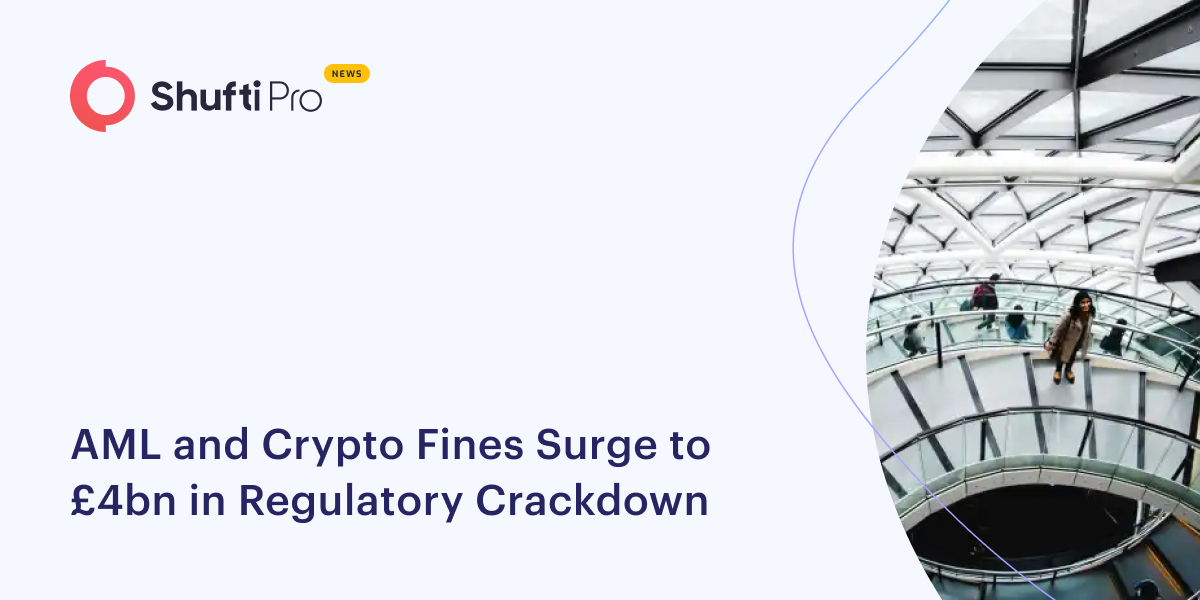AML and Crypto Fines Surge to £4bn in Regulatory Crackdown

The global AML fines surged 53% in 2022, while crypto fines rose over 90% as regulators cracked down on financial misconduct.
The financial institutions were fined nearly $5bn (£4.04bn) in 2022. According to Rory Doyle, Fenergo’s financial crime policy manager, the hop was connected to a massive upsurge in fines levied at crypto companies. The fines associated with the sanctions-busting commodity trading in the wake of the Russian invasion of Ukraine and the settling of legacy problems.
The figures for 2022 included a $2.1bn (£1.7bn) fine issued to Danske Bank by the US Department of Justice in December, the largest AML fine issued in history. While the fines increased globally, the UK anti-money laundering fines fell from $436.5 million to $188.2 million the year before.
However, the number of fines issued tripled, with 14 fines issued in the UK in 2022, compared to just 4 in 2021. FCA (Financial Conduct Authority) reported Santander’s largest fine of a $132 million penalty.
The Fladgate partner Douglas Cherry revealed that the FCA’s approach was changing over issuing AML fines to focus more on individuals.
“In the FCA world here in the UK we are seeing an increased focus on individuals with responsibility for anti-money laundering compliance through investigations and enforcement fines and/or prosecutions in very serious instances of the breach,” he said.
Five of fourteen fines issued this year by the FCA were to specific individuals, up from none the previous year.
The fines to individuals increased 89%, largely due to crypto-related fines. From $16.5 million in 2021 to $31.2 million in 2022. The trading commodity futures trading commission experienced the largest individual penalties issued to the three co-founders of the crypto exchange BitMEX, summing to $30 million for anti-money laundering and other violations.
The total fines of crypto firms and their employees surged 92% to $193 million. Doyle, the crime policy manager said, “Crypto firms need to get their houses in order… as they don’t have the liquidity to deal with large fines.”
“While we are seeing a higher standard of compliance across established financial institutions, the crypto industry has a lot of catching up to do.”
While talking about the crypto fines, Doyle drew attention towards Russian sanctions on the year’s figures, he also revealed that the sanctions will persist to be a subject in the future.
“Prior to the Russian invasion of Ukraine, vast amounts of Russian wealth were channelled into global financial centres including London.”
“This wealth belongs to individuals who may now be sanctioned and unless financial institutions have a robust verification of beneficial owner policy that can identify and block any sanctioned individuals and entities, we can be certain to see more billion-dollar penalties in the future,” Doyle said.
Suggested Read:
Bulgarian Prosecutors Investigate Crypto Lender Nexo for Alleged Illegal Activities
UAE Issues a Total of $11 Million in Fines for AML Offences in First Half of 2022
Britain’s FCA Fines Ghanaian Bank for Insufficient AML Regulations

 Explore Now
Explore Now













